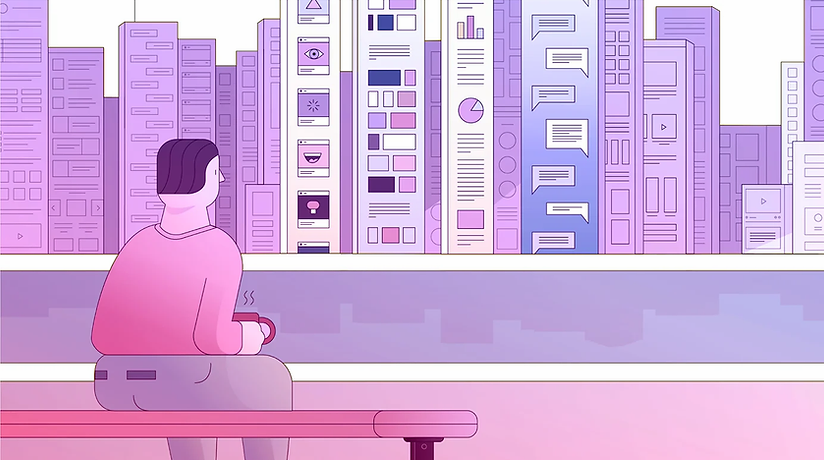I, like many university students, grew up on the internet. Between the tabs and usernames, I slowly built a self. As a slightly awkward high schooler, I found camaraderie in online spaces run by other teenagers, and learned the fundamentals on topics like sex and menstruation by scouring the many corners of YouTube. In elementary school, I sustained a friendship over weekly Skype calls, and later, I hesitantly organized my first date through an app.
I used to relish having pieces of my past self preserved forever in the digital ether. As I have grown, however, I often wonder whether I have given too much of myself to the web, been molded to conform too intimately to its addictive designs. Depictions of the internet in the media have no doubt shaped how I see my own agency online. The Internet Novel, a recently emerged genre within popular media concerned with dramatizing our digital lives, often represents the internet as a force of corruption. Social media films of the past few years like Mainstream (2020) or The Social Dilemma (2020) depict society’s self-destruction in a vapid arena of likes and comments. Attention spans are fleeting, anger ineffectual, or so the story goes. The screen’s sheen has turned slimy: Users are perpetually distracted, scrolling into their own abyss. A “digital detox” frequently sounds promising, a key to some spiritual rejuvenation.
Though I may romanticize an unplugged society, the virtual world is here to stay. Trying to purge myself of digital attachment has never been productive: When my weekly screen time report tells me that I’ve reduced my phone usage, the morsel of pride that creeps in—some illusion of management or healing—only sustains my unhealthy habits. Instead, when I find myself falling into a tedium of passive scrolling and watching, I try to remember that, contrary to monolithic media depictions, I’m not just a mindless idiot hypnotized by the algorithm. There are ways of using technology without existing within its predatory designs.
Instagram user @sighswoon, for instance, tells her followers to not feel guilty when they’re having a good time online. In her guide to having a positive experience on the app, she advises that feeling joy may just mean that you’re finally using it correctly. Gabi Abrão, the artist behind the page, advocates for people to use social media with intention. Abrão first started the “digital resting point,” a genre of Instagram stories that includes peaceful nature scenes—a trickling waterfall, gentle waves, a spiralling flock of birds—accompanied with the text along the lines of “congratulations!” and “stay as long as you’d like.” Coming across one of these posts makes me feel like a character in a video game suddenly surfacing into reality, pressing pause on the preceding action. When the momentum of social media becomes laborious, I log off.
In defiance of the discriminatory violence of algorithms and data collection emerges “data healing.” Jumpstarted by curator Neema Githere, the term refers to the practice of reorienting our relationship to technology in alignment with spirituality and nature. The project’s web page yields resources that explain the hostile tactics of our digital interfaces, rituals for dealing with stressful encounters on social media, and interactive technologies designed with marginalized communities in mind.
In 2017, Netflix’s CEO named its biggest competitor sleep. Within the capitalist architecture of Big Tech, these holistic digital practices then reflect a collective will to care for each other’s well-being. In spite of the superficial imitations of human connection promoted by likes and threads, internet communities can still help foster the real thing.
Especially during times of isolation, I have learned to not be too hard on myself when attempting to reorient my relationship with technology. Like our physical world, nothing in the virtual realm exists on a polar good-evil binary. Though cyberspace is often described as an attention economy, I have come to the realization that my attention is not just a commodity to be exploited, but that I can redirect my energy to deeper forms of connection and care.









